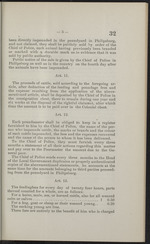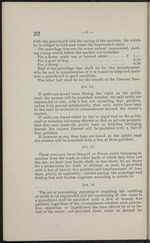| 1 |
 |
“...5
321
been directly impounded in the poundyard in Philipsburg,-
and not claitaed, they shall he publicly sold by order of the
Chief of Police, each animal having previously been branded
or marked with ^ durable mark as in evidence that it was
sold by public authority.
Public notice of the sale is given by the Chief of Police in
Philipsburg as well as in the country on the fourth day after
the animals have been impounded.
Art. 11.
The proceeds of cattle, sold according to the foregoing ar-
ticle, after deduction of the feeding and poundage fees and
the expense resulting from the application of the above-
mentioned article, shall be deposited by the Chief of Police in
the consignation chest, there to remain during one year and
six weeks at the disposal of the rightful claimant, after which
time the amount is to be paid over in the Colonial chest.
Art. 12.
Each poundmaster shall be obliged to keep in a register
furnished to him by the Chief of Police, the name of the per-
son who impounds...”
|
|
| 2 |
 |
“...6
32
with the po and yard and the caring of the animals, for which
he is obliged to feed and water the impounded cattle.
The poundage fees are for every animal impounded, suck-
ing young which follow the mother not included:
For a horse, mule, ass, or horned cattle......... f 1.
For a goat or hog.......................... 0.50
For a sheep............... '..........;----- 0.20
Half of the poundage fees shall be for the poundmaster,
who for and in consideration of it is bound to keep and main-
tain a ponndyard in good condition.
The other half shall be for the benefit of the General Poor.
Art. 14.
If cattle are found loose during the night on the public
road, the owners will be punished whether the said cattle are
impounded or not, with a fine not exceeding four guilders,
unless it be proved satisfactorily that such cattle have been
in the road on account of circumstances beyoDd the owners
control.
If cattle are found either by day or night tied on the public
road or trenches belonging...”
|
|
